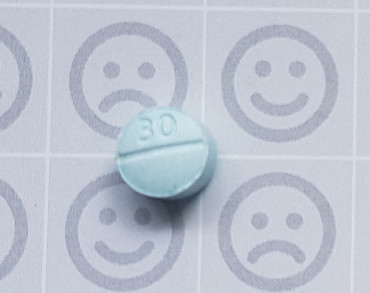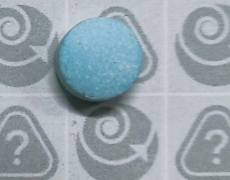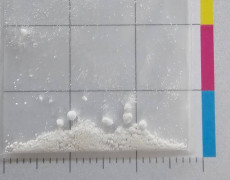What are nitazenes?


A new class of synthetic opioids is becoming prevalent. Find out how to keep yourself safer.
Nitazenes are a group of strong synthetic opioids and can be over to 10x more toxic than fentanyl. They produce strong sedative/depressant effects, and have been linked to drug related deaths, both internationally and in New Zealand.
High Alert has received information they are becoming more prevalent in New Zealand. We first became aware of this in March 2022, when we detected nitazenes in fake blue ‘M30’ oxycodone tablets being sold the Wellington region. You can read the notification about this here.
In October 2022, we also issued a notification when a highly potent opioid, metonitazene, was also found in a yellow powder, likely from crushed tablets. We re-issued this notification in March 2023 after it was linked to further harm. Read more about that here.
We again issued a notification in September 2023 after we became aware that fake oxycodone tablets, containing metonitazene, may have been linked to serious harm. The tablets contained no oxycodone and were of an unknown dosage. You can view that notification here.
While there isn’t a huge supply of nitazenes in New Zealand, these substances have been linked to significant harm, and may be linked to several deaths between 2022 and 2023. Due to their strength and unknown dosage, nitazene compounds can easily lead to an overdose, even among people with experience using opioids.
Stay safer by staying informed. Sign up to receive alerts and notifications about any dangerous drugs in NZ. Check out the alerts page to see what we've already found.
What are the effects of nitazenes?
The physical effects of nitazenes are similar to other synthetic opioids. This can include:
- Feeling euphoric or in a ‘dreamlike’ state.
- Sedation (‘the nod’ – being drowsy and then jerking awake).
- Temporary relief of pain, stress, or low mood.
- Itchiness (in one area or across whole body).
- Severe nausea and/or vomiting.
- Severe sweating or fevers.
- Slowed and/or difficulty breathing.
- Blue lips or fingertips.
- Cold and clammy skin.
- Pinpoint (tiny) pupils.
- Becoming unresponsive and/or losing consciousness.
How to stay safer
We recommend not taking nitazenes at all. It’s concerning that this substance is often misrepresented as oxycodone. Fake oxycodone pills that have been illicitly manufactured often have unpredictable dosages, resulting in unintentional overdosing. Internationally, many pills have been shown to have varying doses even within the same batch. A lethal dose of nitazenes can be equivalent in size to a few grains of salt.
This reinforces why drug checking is so important – if you are properly informed about the substance you have, you are better able to manage the risks. Drug checking is free, legal and completely confidential. Clinics are held regularly across the country to help reduce harm - check the schedule here.
Nitazene compounds can come in a variety of forms including powders, gel caps and liquids. Fentanyl test strips cannot be used to detect metonitazene or other nitazenes.
Avoid combining nitazenes with other substances, especially other depressant drugs including other opioids, alcohol, barbiturates, gabapentinoids, thienodiazepines, benzodiazepines, GHB/GBL and ketamine as these can increase the dangerous effects of opioids (for example, slowing or stopping breathing).
Have the opioid overdose reversal drug naloxone with you and use it if someone is overdosing from opioids – it can save their life. High potency opioids like nitazenes may require more than one dose of naloxone, and you may not be able to administer it to yourself. Check with your local needle exchange outlet to see if they have naloxone available. It can also be purchased direct from Pharmaco.
Remember, nitazenes can be fast acting and you may not initially realise you require naloxone. Even if you have naloxone on hand, you may not be able to administer in by yourself. Avoid using nitazenes alone. Have someone with you who is familiar with and can administer naloxone if needed. Given the unknown strength, potency and duration of effect, any person administered naloxone should continue to be monitored for 2 hours.
Lower doses are less risky. Start off with a small amount to check how it affects you. In general, swallowing a substance has a slower onset than other methods and means there might be more time to get medical help if needed. Remember, the quantity of nitazenes in a tablet can be very different. Don’t assume each tablet will produce the same effects.
Avoid using alone. Have a buddy who can help, and call an ambulance, if things go wrong. Tell them it is a suspected opioid overdose; you won’t get into trouble.
It can be difficult to recognise an opioid overdose. If you aren’t sure whether someone is overdosing, it is best to act like they are. It important to act quickly if you think someone is overdosing as it improves their odds of survival. Call 111 and ask for an ambulance immediately. Don’t leave the person alone.
The signs of an opioid overdose include:
- The person's face is extremely pale and/or feels clammy to the touch.
- Their body goes limp.
- Their fingernails or lips have a purple or blue colour.
- They start vomiting or making gurgling noises.
- They cannot be awakened or are unable to speak.
- Their pupils become very small.
- Their breathing and/or heartbeat slows or stops.
Find out more about nyxoid and naloxone on the NZ Drug Foundation’s website, The Level.
If you have come across nitazenes, or experienced unexpected effects from any substance, please tell us about your experience through our ‘Report unusual effects’ page. It’s completely confidential and will help keep others safe.
If you have any concerns about your own drinking or drug taking, get in touch with the Alcohol Drug Helpline Call 0800 787 797, or text 8681, to speak with a trained counsellor – they’ll be able to provide you with helpful information, insight and support. They’re available 24/7, all calls are free and confidential. You can also chat with the team through the website.
Latest Alerts & Notifications

Highly potent synthetic opioid detected in fake diazepam tablet

Alpha-PVP like substance misrepresented as MDMA in Christchurch

Heroin sold as ketamine in Auckland region

Highly potent synthetic opioid misrepresented as butonitazene
